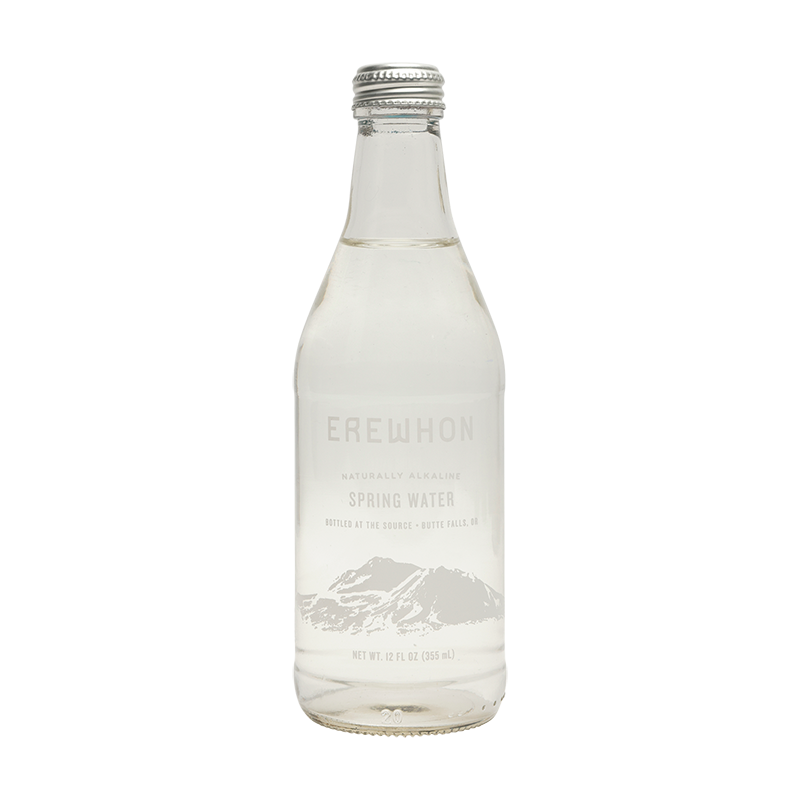
Erewhon Spring Mountain Water
47/100
- Lab Tested
- Yes
- Harmful Ingredients
- 11
- Nutrients
- 9
- Microplastics
- Minimal
Description
Erewhon Spring Mountain Water is a natural spring water sourced from pristine mountain environments. It offers hydration without calories or sugars, benefiting overall health. However, consumers should be cautious of potential contaminants in water sources.
Contaminants
Uranium
0.0000986 pCi/LCan cause kidney damage, increase cancer risk, and lead to other health issues like impacts on bone health and reproductive systems.
- 0.75
Sulfate
1.314 mg/LCan cause diarrhea, especially in infants and unaccustomed individuals, pose risks to susceptible populations, and are subject to ongoing regulatory evaluation due to potential health effects.
Strontium-90
0.178 pCi/LRadiation exposure, bone cancer, leukemia, accumulates in bone tissue, disrupts bone marrow function, toxic contamination
Selenium
0.0004 mg/LToxicity at high doses, selenosis, gastrointestinal disturbance, hair/nail brittleness or loss, neurological abnormalities
Nitrate
0.006 mg/LHigh levels of nitrate in drinking water can cause methemoglobinemia, or "blue baby syndrome," in infants, a condition that reduces the blood's ability to carry oxygen . Long-term exposure to elevated nitrate levels has been associated with an increased risk of certain cancers, thyroid dysfunction, and potential reproductive issues .â
Lithium
0.00087 mg/LToxicity at high doses, kidney damage, thyroid dysfunction, gastrointestinal distress, neurotoxicity, teratogenicity
Chromium
0.000733 mg/LPotential toxicity at high doses, possible kidney or liver damage with excessive supplementation, limited evidence for benefits in healthy individuals
Cobalt
0.000004 mg/LExposure to high level of cobalt, they can suffer from lungs infections such as asthma and pneumonia.
Barium
0.00743 mg/LCan lead to increased blood pressure, heart and nervous system problems, and long-term exposure may cause severe health effects like kidney damage and impacts on other organs.
Arsenic
0.00072 mg/LCarcinogenic, neurotoxic, increased risk of cardiovascular disease, skin lesions, reproductive toxicity, increased risk of diabetes, developmental effects
Ingredients & Minerals
Vanadium
0.0062 mg/LIt is an important component of specific steel alloys since it promotes lightness and provides additional tensile strength of these materials and prevents corrosion. Vanadium oxides can be applied in manufacturing of ceramics, production of coatings for electrochemical tools of energy storage equipment, microelectronic devices and specific glasses used for the production of smart windows.
Sodium
7.1 mg/LEssential electrolyte, supports nerve function, maintains fluid balance
Potassium
1.7304 mg/LSupports cardiovascular health, helps regulate blood pressure, essential for nerve and muscle function, reduces risk of stroke
Magnesium
9.828 mg/LSupports energy metabolism, improves muscle and nerve function, promotes bone health, helps regulate blood pressure, may reduce risk of type 2 diabetes, supports cardiovascular health
Iron
0.00347 mgPrevents iron deficiency anemia, supports cognitive development, essential for oxygen transport, supports immune function
Copper
0.00133 mg/LSupports energy metabolism, essential for iron metabolism, antioxidant defense, connective tissue formation, neurological function
Chloride
0.775 mg/LEssential electrolyte, supports fluid balance, supports nervous system function, supports muscle function
Calcium
22.879 mg/LSupports bone health, essential for muscle function, vital for nerve transmission, important for cardiovascular health
Phosphorus
0.0559Supports bone formation, energy metabolism, cellular function, DNA and RNA synthesis